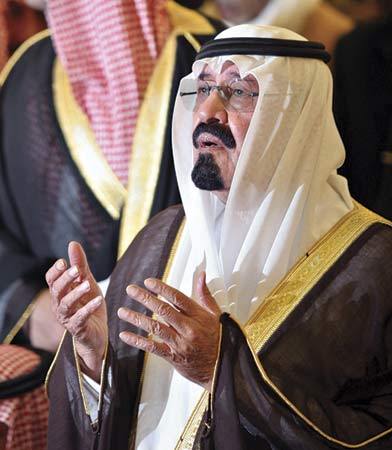
"You must realise that our security and stability are threatened and we need to live up to our responsibilities," said King Abdullah.
"Our summit opens in the shadow of challenges that require vigilance and a united stance," he added.
The GCC summit comes as the embattled regime of Syria, rocked by a nine-month uprising the UN estimates has killed at least 5,000 people, agreed to an Arab League proposal to send observers to the country.
In a clear reference to Syria, the Saudi king urged the Gulf bloc to help their "Arab brothers so that the blood stops flowing and to guard against the risks of foreign intervention."
In addition to Syria, the Gulf leaders will discuss the situation in Tunisia, Egypt and Libya, where popular uprisings have already unseated entrenched dictators this year.
GCC member Bahrain was also hit by a month of protests that it crushed in March, while demonstrators in neighbouring Yemen forced long-time President Ali Abdullah Saleh to sign a power transfer deal.
In Kuwait, the cabinet resigned last month over allegations of corruption and a new government was sworn in on Wednesday with only minor changes to the previous government.
They are also expected to discuss their fears of the growing influence of arch-foe Iran after the US pullout from Iraq.
Their relations with the Shiite-dominated Islamic republic have soured following the unrest in Bahrain and Syria and an alleged Iranian plot to assassinate Riyadh's ambassador in Washington.
The GCC -- comprised of Saudi Arabia, Qatar, Kuwait, Bahrain, Oman and the United Arab Emirates -- was formed in 1981 as a security alliance to counter post-revolution Iran.
---------------------------------------------------------------------------------------
"Our summit opens in the shadow of challenges that require vigilance and a united stance," he added.
The GCC summit comes as the embattled regime of Syria, rocked by a nine-month uprising the UN estimates has killed at least 5,000 people, agreed to an Arab League proposal to send observers to the country.
In a clear reference to Syria, the Saudi king urged the Gulf bloc to help their "Arab brothers so that the blood stops flowing and to guard against the risks of foreign intervention."
In addition to Syria, the Gulf leaders will discuss the situation in Tunisia, Egypt and Libya, where popular uprisings have already unseated entrenched dictators this year.
GCC member Bahrain was also hit by a month of protests that it crushed in March, while demonstrators in neighbouring Yemen forced long-time President Ali Abdullah Saleh to sign a power transfer deal.
In Kuwait, the cabinet resigned last month over allegations of corruption and a new government was sworn in on Wednesday with only minor changes to the previous government.
They are also expected to discuss their fears of the growing influence of arch-foe Iran after the US pullout from Iraq.
Their relations with the Shiite-dominated Islamic republic have soured following the unrest in Bahrain and Syria and an alleged Iranian plot to assassinate Riyadh's ambassador in Washington.
The GCC -- comprised of Saudi Arabia, Qatar, Kuwait, Bahrain, Oman and the United Arab Emirates -- was formed in 1981 as a security alliance to counter post-revolution Iran.
---------------------------------------------------------------------------------------









 Home
Home Politics
Politics









